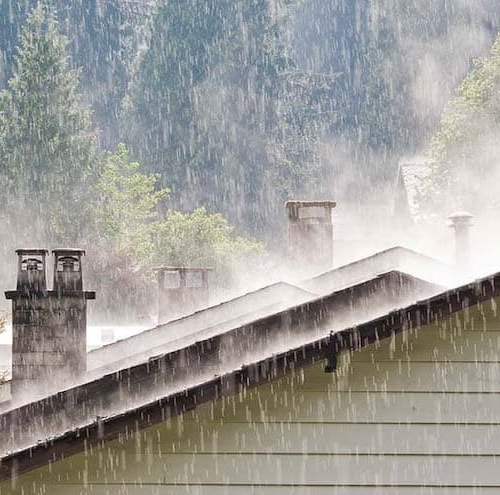A guide to buying a house in a flood zone
Contributed by Tom McLean
Jun 19, 2025
•6-minute read

Many people dream of owning a home near a lake, river, creek, or ocean. However, living near water also comes with the risk of flooding, which can cause significant damage to your home. One inch of water can damage your home to the tune of $25,000, according to the Federal Emergency Management Agency. If you’re considering buying a home in a designated flood zone, it’s essential to understand the risks and be prepared in case your home is flooded.
Key Takeaways:
- FEMA evaluates flood risk and designates zones based on the level of risk.
- Homes in high-risk flood zones might be less expensive, but they can require costly flood insurance.
- Not all states require sellers to disclose a house’s flood zone or flood history, so it’s essential for buyers to conduct their own research.
What is a flood zone?
A flood zone is an area classified by FEMA to be at risk for flooding. FEMA uses ranked codes to measure how much of a risk a flood is in a specific zone.
- High-risk zones: These zones have a 1% or higher chance of experiencing flooding in any given year, with a 26% chance of a flood occurring during a 30-year mortgage period.
- Moderate-risk zones: These zones are less likely to experience flooding, though it’s still possible.
- Minimal-risk zones: These zones have minimal, though possible, risk of flooding.
Is my house in a flood zone? Assessing your risk
Before buying a property in a flood zone, consider the following:
- Find your zone on the flood map. The first step is to check the Flood Map Service Center to determine the zone in which your potential home is located.
- Understand your risk. All flood zones carry the risk of significant flooding, regardless of how low that risk may be. According to the National Flood Insurance Program, the federal program that underwrites flood insurance policies for those in participating communities, 40% of all claims come from people outside of high-risk zones. Floods can occur even outside these zones. Some have pointed out that due to changing weather patterns, FEMA’s maps may not be as accurate as they should be.
- Budget for flood insurance: Because traditional homeowners insurance does not cover flood damage under most circumstances, you will likely have to purchase separate flood insurance. This means that your monthly payments will be higher than those of a similarly priced home elsewhere. Some lenders may also require that you purchase a Natural Hazard Disclosure Report for homes located in a flood zone.
Buying a house in a flood zone: What are the risks?
If your dream home is in a special flood hazard area or coastal high hazard area, you’ll need to be prepared for the risks.
Potential for significant flood damage
As with anything, insurance cannot cover all damage. Losing all or even some of one’s personal belongings due to a flood can be emotionally and financially devastating. Evacuation might be necessary, and your home might be destroyed beyond repair. Having to start over somewhere else can have a significant impact on one’s mental and financial health.
Even minor flooding can cause a lot of damage and hassle. An inch of water might mean replacing flooring, drywall, and furniture, which can quickly add up.
High cost of flood insurance
The cost of flood insurance is generally tied to the risk of flooding in your zone. Flood insurance is a separate policy designed to protect you in the case of a flood. It covers more than the hazard coverage some home insurance includes. While it will protect you in a disaster, it can be costly.
According to Forbes, the average flood insurance policy premium was reported in 2024 to be $1,152 a year. In some states, this can exceed $2,000, and this is in addition to regular homeowners insurance.
You can get flood insurance through the National Flood Insurance Program or a private insurance carrier. NFIP offers up to $250,000 in coverage for the home’s structure and up to $100,000 in coverage for personal belongings. Private carriers might offer larger policies or additional coverage.
Homes in flood zones can be difficult to sell
If you’re worried about living in a flood zone, others probably are, too. It can be challenging to find a buyer willing to move into a high-risk flood zone. As a house is often the most significant purchase someone will make in their life, they want to be sure it will be safe.
Buying a house in a flood zone: What are the advantages?
Living in a flood zone presents clear challenges, but there are also a couple of advantages.
Lower prices
Flood risk can often depress a home’s value, although this may not make a significant difference in vacation hotspots. However, buyers willing to take the risk and prepare for any issues might be able to secure a home that would otherwise be out of their budget, even after factoring in flood insurance.
Waterfront property
While being in a flood zone does not necessarily mean living on the water, you’re more likely to live on or near water. Depending on your lifestyle, this can be worth the risk. If being able to go swimming or fishing just a quick walk or drive from your front door is a home buying must-have, you’re probably willing to take the risk. The same applies to those who enjoy watching the sunset over the water. Home safety precautions can be taken against flooding, and some risks can be reduced.
How can I obtain a mortgage for a house located in a flood zone?
Getting a mortgage for a home in a high-risk flood area isn’t so different than getting one for a home elsewhere. The primary difference is the type of insurance you’ll need. Depending on your zone designation, your lender or the government might require that you have flood insurance in addition to your home insurance.
You must factor in the cost of flood insurance premiums when considering your monthly annual costs. Getting preapproved for a mortgage will help you determine how much house you can afford and if flood insurance is in your budget.
Questions to ask before buying property in a flood zone
If you’re interested in a property that’s in a floodplain, speak with your real estate agent to learn more about the property’s history.
Can I get insurance for the property?
You can usually obtain insurance for a property in an area at risk of flooding, but this is not always the case. Insurance companies might consider specific properties to be too risky to insure. However, being rejected by one company does not necessarily mean you’ll be rejected by all of them. It’s wise to shop around for insurance regardless of the situation.
What is the home’s flood zone designation?
We’ve already mentioned FEMA’s flood map database. Be sure to check the address of the property you’re interested in here.
How often does this property flood?
Unfortunately, disclosing flood risk is not legally required in all states. Regardless of which state you live in, be sure to do your due diligence. Find out if the house has been flooded before, if it’s hard flood damage, and what the neighborhood risks have been in recent decades.
What flood mitigation has been done on the property and in the community?
Don’t assume anything. Speak with the seller about your concerns and what has been done to the property to mitigate risk. Work with your real estate agent to learn about the local government's efforts to protect the community. Be sure to ask about floodplain management.
Can my flood zone code get changed?
Due to changing weather patterns and urban development, FEMA regularly reassesses flood zone codes. Communities can also propose changes to their own code if they find themselves facing floods more frequently than their original code suggests. If your chances of flooding increase, so do your code requirements and, in turn, possibly your flood insurance premiums.
The bottom line: Carefully weigh buying a home in a flood zone
Ultimately, the most important thing when choosing a home is your level of comfort. Are you comfortable with the risk of flooding, and would you be able to financially recover from any potential damage? Maybe having flood insurance will be enough for you, but consider all factors carefully.
If you’d like to see what you can afford, regardless of where your dream home is, you can start the approval process today.

Kate Friedman
Kate is a contributing writer and publisher who has worked with Rocket since 2022. She also works as a middle-school interventionist and has taught personal finance and life skills to high-schoolers.
Related resources
4-minute read
What is hazard insurance for homes: A homeowners guide
Hazard insurance protects your home from natural disasters. Learn what it is, what is covered under hazard insurance and how it’s different from homeowner...
Read more

7-minute read
Disaster preparedness plan and checklist
A natural disaster can destroy years of hard work in seconds. Prepare for the unexpected with an emergency plan for home to help minimize destruction.
Read more

8-minute read
The pros and cons of buying a lake house
Before you buy a lake house, you should understand the financial implications of owning one. Here’s a comprehensive list of pros and cons to help you.
Read more